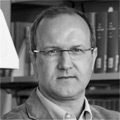Prof. Hellmann Examines the Clash Between Germany and Russia

Gunther Hellmann
Goethe-University, Frankfurt
Gunther Hellmann is Professor of Political Science at Goethe-University, Frankfurt am Main and Adjunct Professor at the Bologna Center of the School of Advanced International Studies, Johns Hopkins University. He is a Principal Investigator and Member of the Board of Directors of the Frankfurt Cluster of Excellence “Formation of Normative Orders.” In 2012 he will serve as the “Harris Distinguished Visiting Professor” at Dartmouth College. His research interests are in the fields of foreign policy analysis, esp. German and European foreign policy; international security, esp. transatlantic and European security; and international relations theory.
His recent publications include “International Relations as a Field of Studies”, in: Bertrand Badie, Dirk Berg-Schlosser and Leonardo Morlino (Eds.): International Encyclopedia of Political Science, London: Sage Publication 2011; Ed. “The Forum: Pragmatism and International Relations”, International Studies Review 11:3 (2009), 638-662; Ed. “Special Section” on “IR Theory and (German) Foreign Policy”, Journal of International Relations and Development 12:3 (2009); Die Semantik der neuen deutschen Außenpolitik. Eine Analyse des außenpolitischen Vokabulars seit Mitte der 1980er Jahre, Wiesbaden: VS Verlag für Sozialwissenschaften 2008 (Ed. with Christian Weber/Frank Sauer); “Inevitable Decline versus Predestined Stability: Disciplinary Explanations of the Evolving Transatlantic Order”, in: Anderson, Jeffrey/Ikenberry G. John/Risse, Thomas (Eds.), The End of the West? Crisis and Chance in the Atlantic Order, Ithaca: Cornell University Press 2008, 28-52; Handbuch zur deutschen Außenpolitik, Wiesbaden: VS Verlag für Sozialwissenschaften 2007 (Ed., with Siegmar Schmidt/Reinhard Wolf); Ed., De-Europeanization by Default. Germany’s EU-Policy in Defence and Asylum, Houndmills, Basingstoke: Palgrave MacMillan 2006.
AGI Non-Resident Fellow Prof. Gunther Hellmann examines the clash between Germany and Russia over the Ukrainian crisis in the framework of Germany’s understanding of itself as a twenty-first century power–Gestaltungsmacht–versus a designation of Russia as reverting to nineteenth century tactics. Referencing the foreign policy speeches delivered by President Gauck and Foreign Minister Steinmeier at the 2014 Munich Security Conference, Hellmann explains how Germany’s evolving sense of its global purposes is framed in its definition of both power and policy in increasing contrast to Russian definitions. Despite previous efforts to seek common denominators with Moscow, the way ahead for German-Russian relations may be a rocky one depending on Russian behavior in the future.








